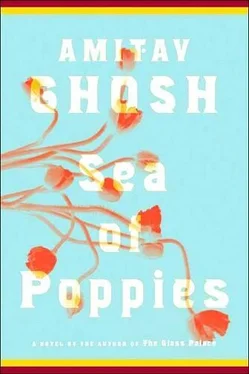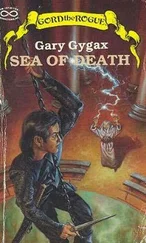+duffadar/dafadar: One of those many ranks of lower officialdom that found an afterlife in the Oracle. 'The magnitude of the part these men once played in our lives can be easily judged by looking at any kalkatiya migrant's certificate of emigration, on the back of which is almost always noted the name of the duffadarwho was responsible for the recruitment (and usually in the scribbled Bengali script of some harried cranny).'
dumbcow/dumcao (*The Glossary): 'The popularity of this word and its steady advance towards the Peerage of the Verb is due no doubt to its bilingual expressiveness, a dumbcowingbeing a harangue intended to cow – or better still gubbrow– its victim into dumbness.'
+dumbpoke: Kitchens which served 'casseroles' never failed to ignite Neel's ire, for he believed that word to be an insufferable piece of pretension, especially when the dumbpokewas at hand and ready to use. The recent resurrection of the Hind. original dumpukht would in no wise have consoled him, since it is now used in a strictly Hind. sense.
+dungaree/dungri: 'What dinghywas to boats, the Hind. dungri was to cloth – a coarse cotton fabric unworthy of survival, far less coolin-dom.'
+dupatta / dooputty:See chuddar / chadar.
durwauza-bund (*The Glossary): 'These were the words which khidmutgarswould use to turn away unwanted visitors: in a BeeBee's mind the use of the Hind. for "closed door" was more acceptable than an outright lie. The Oracleis sure to welcome it, for the sheer cunning of its reasoning.'
+durzee: 'The mysteryof tailoring.'
Faghfúr of Maha Chin (*The Glossary): 'Such was the Laskari phrase for the "Emperor of China", and if you asked to whom it referred, they would tell you, almost always, that the personage in question was the Raja of Chin-kalan, which was but their name for Canton.'
faltu-or phaltu-dol (*Roebuck): 'This is, strictly speaking, the Laskari term for "jury-mast", and it is in that sense that it often finds employment in shipboard girlery, being understood to refer to a foreshortened, unreliable or deficient organ of increase.'
faltu/phaltu-tanni (*Roebuck): See turnee.
+fanqui: 'The anglice of fan-kwei , which the *The Linkisterdefines as "foreign devil". The term may easily, and less offensively, be translated as "unfamiliar spirit".'
+foozle/foozilow: 'Almost certainly from the Hind. phuslana , "to make a fool of ", which is said to have been further transformed in America to foozleand even comfoozle.'
+free: Neel was much in love with this word and would have been glad to know that the Oraclehad fully acknowledged it to be a derivation from the common Sanskrit and Hind. root priya ('dear' or 'beloved'). 'As for the truth of "freedom" it will remain for -ever elusive until such time as it is wrested free of English; not till then will the fuller meaning of priya be restored to it.'
fulana-jíb (*Roebuck): Flying-jib. See dol.
fuleeta-pup (*The Glossary): 'A consummer's mishearing of "fritter-puff " that found its way into the lexicon against all odds.'
gabar (*Roebuck): Skyscraper or sky-sail. See dol.
gadda / gudda / gadha / gudder (*The Glossary): 'Why is it that when the sahibborrows a Hind. zoological term, it is only for the purposes of abuse? It is, of course, impossible to deny that gadha is often used in Hind. to mean "fool", but it is true also that the ass is the familiar of the Lord of Mysteries, Vishwakarma. Ooloo/ullu, similarly, may well sometimes be used to mean "fool", but who can forget that the owl is also the familiar of the goddess Lakshmi? As for bandar, it has none of the abusive implications of its English usage, being employed rather as a term of affection or endearment, in the sense of "mischievous".'
galee / girley / gali (*The Glossary): 'Oaths, obscenities; from which girlery, the equivalent of the Bengali gali-gola – pertaining to abuse'.
+ganta/ghanta: 'Bell, from which Hind. "hour". But to "ring your ganta" is considered girlery.'
gavi (*Roebuck): Topsail. See dol.
ghungta: See dooputty/dupatta.
girlery: See galee.
girmitiya: 'The genius of the Bhojpuri language,' writes Neel, 'derives this memorable term from the root girmit, which is a corruption of Eng. "agreement" [or indenture]'.
+godown: See backshall.
gol-cumra (*The Glossary): See cumra.
+gomusta/gomushta: 'For this mysteryof the daftarthere can be no simple definition, for he is to be seen discharging as many functions as can be said to exist in such a place: he writes accounts, he dumbcows, he gub-brows, he serves as a druggermanwhen needed. All that can be said of him with any certainty is that the title could not come to him until he had gained the Burra Sahib's ear.'
goolmaul/gollmaul (*The Glossary): Neel took issue with Sir Henry's defi -nition of this word as 'mix-up': 'It is patently evident that this word was once merely Hind. slang for "zero" (literally "circular thing"). In this sense it referred originally to a conundrum or puzzle. It was only by extension that it came to mean "mix-up", but of late it has been so overburdened by this connotation that it is now generally used to signify an uproar, or a great fuss.'
goozle-coonuh/goozul-khana (*The Glossary): See bobachee.
gordower (*The Glossary): 'A type of Bengal boat as ugly as its name.'
grag (*Roebuck): Grog, from which the term by which taverns were affectionately known: grag-ghars.
griblee (*Roebuck): Graplin, der. Eng.
+griffin/griff: See pucka.
gubber (*The Glossary): 'That this bandookicoin bore a resemblance to the Hind. for "cow-dung" gave it many added uses in the dufter, for the cranny could not be dumbcowedfor saying to a Burra Sahib: "Sir, may your pockets be weighed down with gubbers."'
gubbrow/ghabrao (*The Glossary): See dumbcow.
+gup: 'Talk, gossip; but never in English, gup-shup, which is so much the better expression.'
+halalcor/halalcore: 'In English this, like harry-maidand muttranee, was one of many titles for the mysteriesof toiletry.'
harry-maid (*The Glossary): See halalcore.
hathee-soond (*Roebuck): See bhandari.
hazree/hazri (*Roebuck): Muster ('from which', adds Neel, 'we have chotee hazree, which wakes the sahib in time for the daily mustering').
Читать дальше












